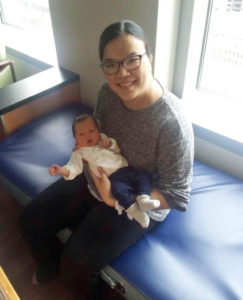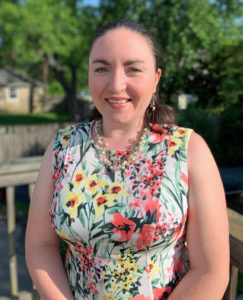Special Report: Pregnancy & birth in the time of COVID
By Mary Ann PriceThe spread of the COVID-19 virus has led to extreme changes in daily life. Schools and many businesses are closed; social distancing mandates are the new norm; and people are being told not to go to hospitals unless they need immediate medical care. Regular medical care, however, is something that pregnant women need; when the time comes they will go to a hospital to have their baby. For three women with ties to Canton, being pregnant during this time heightened their sense of concern and reinforced the importance of family.
Kasey Coyne and her husband, Bryan Van Rees, welcomed their son, Jack Edward, on March 26 in Chicago. The baby, who weighed 7 pounds, 15 ounces, is named for a great-grandfather on each side of his family. Coyne was the salutatorian for the Canton High School Class of 2004. She went on to study at Boston College and Northwestern University and is now in her last year of an internal medicine residency at Northwestern Memorial Hospital in Chicago. In July she plans to start a fellowship in endocrinology.
Recalling what it felt like to be pregnant and to be a doctor working with patients, Coyne said that she found her feelings about the upcoming birth of her son to be similar. “There’s a lot of uncertainty that goes into becoming a parent for the first time,” she said.
Since she worked at the hospital, she was well aware of potential health implications and restrictions on visitors. As the number of COVID-19 cases increased and her due date approached, she realized something very quickly — how “dramatically differently” the experience was going to be.
In early March, her supervisors at Northwestern made the decision to have her stop seeing patients and stay home. “It was a stressful feeling to be separated from my colleagues,” Coyne said.
On March 25, she had an appointment with her doctor and was told that she was going to be induced. The next day, Jack Edward was born via Caesarean section at Northwestern Medicine Prentice Women’s Hospital.
In spite of what was taking place with the virus, Coyne felt good about her experience with the birth of Jack. “I felt confident in all the precautions the hospitals were taking,” she explained. She gave birth in a building other than the one where she worked and the staff had begun to limit exposure between patients and medical personnel. A big boost to her confidence was having Bryan at her side.
“He was able to be there the entire time,” she said. “I don’t know what I would have done without him.”
The couple went home with the baby 72 hours after he was born. They did not have any visitors; Coyne had one nurse during the day and another at night. The staff had started wearing masks. Coyne’s parents, John and Diane Coyne of Canton, had planned to fly to Chicago for a short visit to meet their new grandson and then return in April to spend more time with everyone. But their first visit will take place at a later date. “They could not, or should not, travel,” said their daughter. “We want to keep everyone safe first and foremost.”
Coyne and Van Rees have taken their son to the doctor for his first visits. “Any time you leave the house it’s a little worrisome,” Coyne said. But she felt reassured that the staff at the pediatrician’s office limited the number of sick visitors, wore masks and gloves, and had Coyne and Van Rees arrive at exactly the time of their visit so they could walk them right into an exam room.
Coyne is taking everything in stride. “It’s been a very interesting experience,” she said of becoming a mother during the pandemic. “It’s not what we thought it would be, but what else can you do? We’ll get through it, hopefully sooner than later.”
***
Lexie D’Agostino Panza also graduated from Canton High School in 2004. She did her undergraduate studies at Wellesley College, earned a master’s degree from Emerson College, and now works in human resources at Babson College. She and her husband, Greg Panza, were very excited when they found out last August that they were going to be parents in April of 2020.
“I had a pretty easy pregnancy,” Panza said. Things went smoothly until late winter when updates about COVID-19 created changes for everyone.
“Everything really started ramping up in early to mid-March,” she said.
They were hearing lots of information and trying to sift through it and make plans. One area they had especially focused on was that of restrictions at Norwood Hospital, where the baby was going to be born. They had heard that in other parts of the country, women were not allowed to have anyone with them for support during labor and delivery. “We were very concerned,” Panza said. “We were very scared.”
As Panza went for weekly checkups, the restrictions started to increase. She had been allowed to bring someone along for the appointments, but ultimately had to go by herself and wear a mask. The hospital also tightened up on their protocols: women in labor were allowed to bring one person for support, but that person would have to stay in the hospital along with the new mother and the baby for the duration of the stay. No other visitors were allowed.
Greg was ready. “He had been packed for weeks,” Lexie said. The couple packed clothing, toiletries, snack food, books, magazines, clothing for the baby, and extra-long phone charger cables, which Lexie had read online was an item that many couples wished they had brought to the hospital.
Lexie’s due date was April 2, but since the baby was doing well, doctors decided to let things move along. They scheduled an induction for April 14, but on April 13, a stormy day, Lexie went into labor. “We drove in a monsoon and left the day it snowed,” she said.
After their son, Nolan Gregory Panza, was born on April 13, the family stayed together in Panza’s room until she and Nolan were discharged on April 16. The couple wore masks every time someone came into the room, per the hospital’s restrictions, but otherwise could remove them. They had no visitors. They have also worn a mask when visiting the pediatrician.
Panza said that she was concerned and scared as April 14 approached, and takes comfort in the fact that her husband was with her. She told him that she couldn’t imagine going through it without having him there. “It was definitely harder than we thought it was going to be,” she said. The hardest part for her, however, was not seeing her parents and in-laws afterwards and introducing them to the baby. Lexie’s parents, Pam and Dr. Robert D’Agostino, live in Canton and have been able to drop meals and supplies off outside their house. Greg’s parents live in Connecticut.
“We have no idea when we’re going to see our families,” she said. “Maybe June at this point.”
***
Katie Murray and her husband, Ben, moved to Canton nine years ago. They have two sons, ages 7 and 4, and Katie is pregnant with the couple’s first daughter. Her due date is June 1, but by the end of April, her doctor had already scheduled a C-section for May 11 for health reasons. She is working full-time at home, as is her husband, and they are also working with their older son on his schoolwork and providing learning activities for their younger son. To say that getting through her daily life is a challenge is an understatement.
“I don’t recall ever being this stressed about a pregnancy,” Murray said. “The amount of anxiety and stress and fear, fear of getting the illness, health ramifications, the stress of homeschooling.”
Murray works for a telehealth company and had to quickly adjust to changes in her schedule as the virus began to impact the world. “When COVID-19 hit, the workload quadrupled,” she said. She found herself working 50 or more hours over five or six days a week and answering emails at 11:00 at night.
“It was just a different level of stress that I was anticipating,” she said.
The Murrays live in a duplex and have good friends living on the other side who take care of their sons during normal times, and they are continuing to help them with childcare. Katie was hoping to create a room for her daughter, but did not have a chance to get a contractor to come in before the shelter in place advisory took effect.
In order to try and control her stress, she has been speaking to a counselor once a week and figuring out what she can control. She managed to set some things up for the baby’s arrival and decided to begin her maternity leave early. Responsibilities at work have become more manageable, but there are still things that she struggles with.
“Fear of the unknown. Every day there are different regulations,” she said. “They get me very emotional.”
Recently she learned that new mothers who give birth via C-section will be discharged from the hospital after two days. If her daughter is not ready to go home with the Murrays, she will have to stay in the Neonatal Intensive Care Unit (NICU). Katie cried for two hours after learning the news and developed a migraine that lasted for three days. “That’s my body telling me, ‘You can’t handle much more of this,” she said.
Katie worries about her mother, who is 73 and hasn’t been able to visit and lend her support to the family. “It’s too much of a risk,” she said.
In the meantime, Katie, who describes herself as a normally happy person who sees life as a glass half full, is doing what she can to adapt to a new way of living. “At the end of the day,” she said, “it’s a new waiting game and knowing what you can control. I’m struggling with that.”
Short URL: https://www.thecantoncitizen.com/?p=66459













